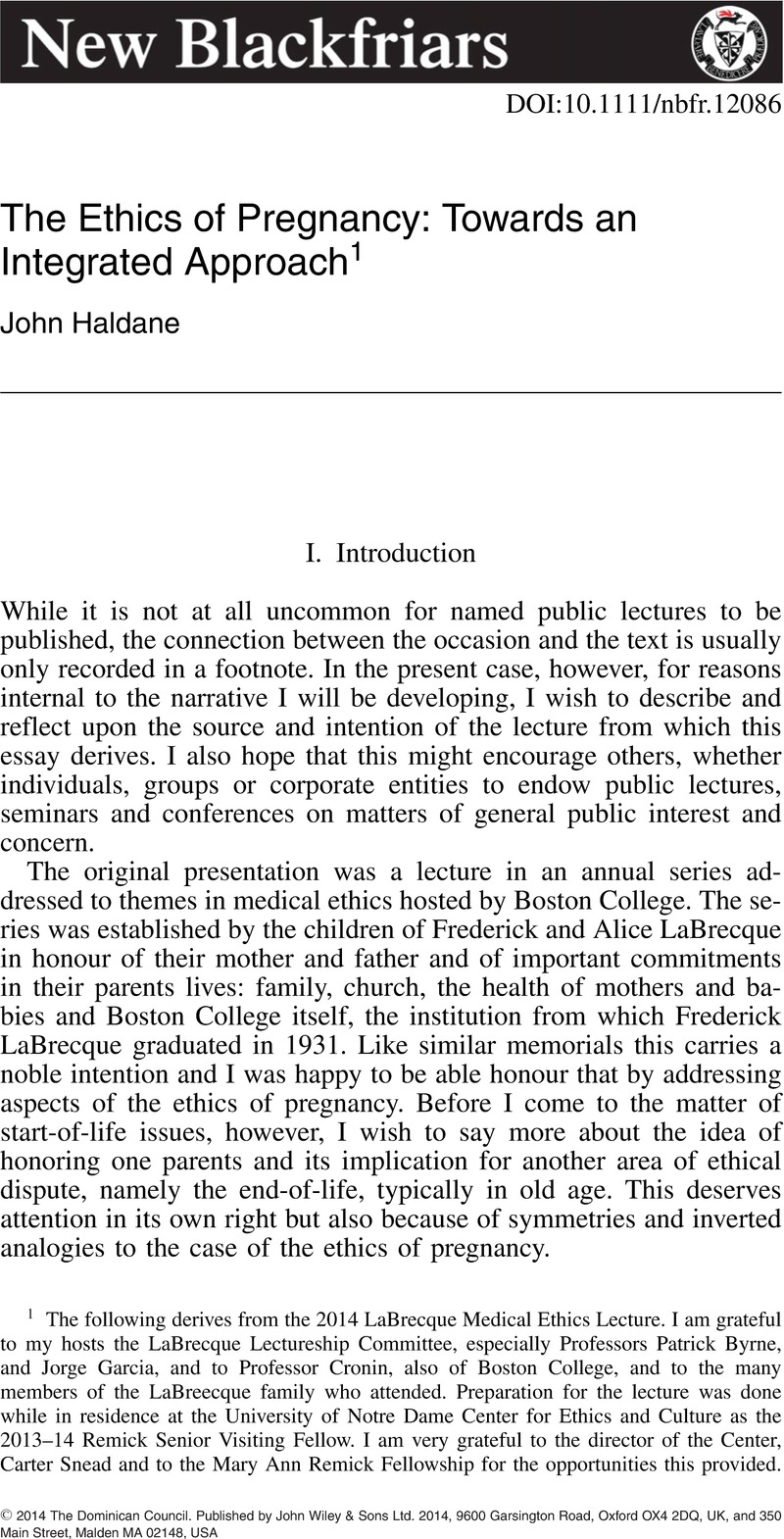No CrossRef data available.
Published online by Cambridge University Press: 01 January 2024

The following derives from the 2014 LaBrecque Medical Ethics Lecture. I am grateful to my hosts the LaBrecque Lectureship Committee, especially Professors Patrick Byrne, and Jorge Garcia, and to Professor Cronin, also of Boston College, and to the many members of the LaBreecque family who attended. Preparation for the lecture was done while in residence at the University of Notre Dame Center for Ethics and Culture as the 2013–14 Remick Senior Visiting Fellow. I am very grateful to the director of the Center, Carter Snead and to the Mary Ann Remick Fellowship for the opportunities this provided.
2 Mary Warnock, ‘A Duty to Die?’ OMSORG 2008 (4) 3–5.
3 Jackie Macadam ‘A Duty to Die?’ Profile of Baroness Mary Warnock, Life and Work, October 2008, 23–5. See also Warnock, Mary and MacDonald, Elisabeth, Easeful Death: Is there a Case for Assisted Dying (Oxford: OUP, 2009)Google Scholar
4 Jackie Macadam, ‘A Duty to Die?’ 25.
5 For more on this see Haldane, John, ‘Reasoning about the Human Good and the Role of the Public Philosopher’ in George, R. and Keown, J. eds. Reason, Morality and Law: The Philosophy of John Finnis (Oxford: OUP, 2013) Ch. 3Google Scholar.
6 Summa Theologiae, Ia IIae, q 94, a. 2. http://home.newadvent.org/summa/2094.htm#article2
7 It is unfortunate, I think, that the term ‘pragmatism’ is used in Fides et Ratio in a part of the encyclical concerned with criticizing various philosophical ‘positions’: “No less dangerous is pragmatism, an attitude of mind which, in making its choices, precludes theoretical considerations or judgements based on ethical principles”. While there is a familiar use of “pragmatic” in which it is contrasted with taking note of moral reasons this is not implied by the philosophical theory advanced by C.S. Pierce who was committed to the immutability of truth, see ‘A Neglected Argument for the Reality of God’ in Collected Papers of Charles Sanders Peirce edited by Hartshorne, Charles and Weiss, Paul (Cambridge, MA.: Harvard University Press, 1935) Volume 6, paragraphs 452–485Google Scholar.
8 For further discussion of these matters see Haldane, John and Lee, Patrick, ‘Aquinas on Human Ensoulment, Abortion and the Value of Life’ Philosophy 78, 2003 (3), 255–278CrossRefGoogle Scholar and ‘Souls and the Beginning of Life’ Philosophy 78 (4), 521–531Google Scholar.
9 Beattie, Tina, ‘Catholicism, Choice and Consciousness: A Feminist Theological Perspective on Abortion’ International Journal of Public Theology 4, 2010, p. 59Google Scholar, also, in briefer form, in ‘Abortion, Tradition and Compassion’ The Tablet 4 June, 2010.
10 See Summa Theologiae, Ia, q. 105, a. 1, ad 1.
11 Op. cit., p. 53.
12 Summa Theologiae, Ia q. 119, a. 2
13 Donum Vitae: Instruction on respect for Human life in its origins and on the Dignity of Procreation. Replies to Certain Questions of the Day (Vatican, 1987) III ‘Moral and Civil Law’.
15 What the implications of the categorical imperative might be for the issue of abortion is a matter of some dispute. In a widely cited article Harry Gensler gives ‘A’ Philosophical Studies, 49 (1) 1986, 83–98CrossRefGoogle Scholar. This is then taken issue with by Lara Denis in ‘Animality and Agency: A Kantian approach to Abortion’ Philosophy and Phenomenological Research, 86 (1) 2008, 117–137Google Scholar.
16 Weil, Simone, ‘The Iliad, or the Poem of Force’, translated by McCarthy, Mary in Pendle Hill Pamphlet no 91 (Wallingford, PA.: Pendle Hill Press, 1956)Google Scholar reprinted in the Chicago Review, 18 (2) 1965, 5–30, page references are to this later publication.
17 Op. cit., 7.
18 Op. cit., 9.
19 De Veritate, I, 2, ad 2.,
20 Tina Beattie, ‘Abortion, Tradition and Compassion’ op. cit. The same line of argument is presented inter alia in ‘Catholicism, Choice and Consciousness’.
21 ‘Catholicism, Choice and Consciousness’ p. 62.
22 Op. cit., p. 61.
23 On this in relation to Martha Nussbaum's work Hiding from Humanity ((Princeton: Princeton University Press, 2004)Google Scholar see Haldane, John, ‘Recognising Humanity’ Journal of Applied Philosophy, 25 (4) 2008CrossRefGoogle Scholar and Martha Nussbaum's reply in the same issue.
To send this article to your Kindle, first ensure no-reply@cambridge.org is added to your Approved Personal Document E-mail List under your Personal Document Settings on the Manage Your Content and Devices page of your Amazon account. Then enter the ‘name’ part of your Kindle email address below. Find out more about sending to your Kindle. Find out more about saving to your Kindle.
Note you can select to save to either the @free.kindle.com or @kindle.com variations. ‘@free.kindle.com’ emails are free but can only be saved to your device when it is connected to wi-fi. ‘@kindle.com’ emails can be delivered even when you are not connected to wi-fi, but note that service fees apply.
Find out more about the Kindle Personal Document Service.
To save this article to your Dropbox account, please select one or more formats and confirm that you agree to abide by our usage policies. If this is the first time you used this feature, you will be asked to authorise Cambridge Core to connect with your Dropbox account. Find out more about saving content to Dropbox.
To save this article to your Google Drive account, please select one or more formats and confirm that you agree to abide by our usage policies. If this is the first time you used this feature, you will be asked to authorise Cambridge Core to connect with your Google Drive account. Find out more about saving content to Google Drive.